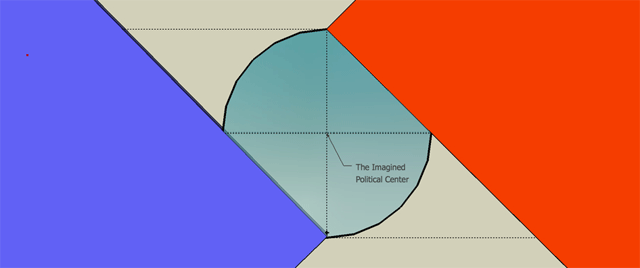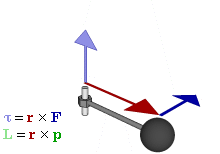February 11, 2008
truth, convenient and otherwise

Conventional wisdom has it that here in the states, the Democrats and the Republicans are at loggerheads. Not only does this not have to be this way but I believe that deep, deep down inside our national psyche, the contrary is more to the truth of the matter. Check out this article about the very interesting current state of politics in the USA at the moment:
A common thread runs through these four issues. Shooting wars and culture wars, immigration and the federal budget--all are examples of the Mick Jagger principle of governance: You can't always get what you want.

I think that when you look closely, very closely, one can see how the dynamic of torque works and that there is a promise if not the fact of the two grand parties working in concert. Remember the mnemonic knuckles of the constitution? Democrats have 2 knuckles and the Republicans have 3 but all five belong to the country as a whole.
We are whole, aren't we?
Back to the article, it's a good one:
Politicians have a limited array of governance tools available to them, and they operate in a world of constrained choices. Voters no doubt wish that the consequences of past policy errors--the Iraq invasion for Democrats, the failure to police the nation's borders for Republicans--could be wiped away. They can't. One part of the electorate believes that providing the best health care to all Americans is a moral imperative. Another part believes that the hundreds of thousands of abortions each year in the United States amount to a holocaust. No matter how passionately held, the first belief cannot make top-flight, universal, affordable health care a reality. Nor can pro-lifers' commitment, by itself, eliminate abortion. Wishing doesn't make it so.A sizable share of both parties' most passionate supporters seem not to understand that basic truth. "Yes, we can!"--so goes the shout that punctuates most Obama rallies. The audience may not realize it, but the spirit of those words is uncomfortably close to the spirit that led the current administration to fight a hard war with too few weapons and too few soldiers. Sometimes, leaders need to say: No, you can't. Problems aren't solved because voters, or the politicians they support, imagine the solutions.
Because these are Democratic-leaning times, Republicans have the most to gain from embracing this year's inconvenient truths--and may have a nearly ideal candidate to do the embracing. John McCain may be better positioned than anyone in either party to secure the southern border without alienating America's Latino population. He has a strong pro-life voting record, but has never been in the thick of the culture wars. On Iraq, McCain is prominently identified with Petraeus and the surge. Politically, he stands in much the same position today as Dwight Eisenhower in 1952: tough-minded and hard-nosed without being reckless--and, like Eisenhower with Korea, he bears none of the blame for the war's mishandling. On spending, McCain may be the country's leading proponent of fiscal discipline: Ross Perot without the lunacy. A McCain-led Republican party could become the party of deficit hawks--just when deficits are about to become the political liability they were in the 1990s.
The two Democrats seem less impressive on this score. Hillary Clinton and Barack Obama talk about border control the way children talk about eating their vegetables. As kids leave the table before the beans and carrots are gone, one suspects a Democratic administration might quit on border security before the borders are secured. Neither sounds much like a deficit hawk. And on the war--the real one--both have made statements that could make wise governance impossible if either reaches power. Political talk matters: It shapes voters' expectations and defines the political context in which decisions are made. Standing tough in Iraq may be impossible after voters have heard, again and again, that their new president is firmly committed to bailing out, as quickly as possible.
Sad to say, the candidate who most often tells unhappy truths may not turn out to be the candidate who wins the most votes. Elections are not always won by truth-tellers; deception sometimes carries the day. John F. Kennedy, whose presidency is often invoked these days, won a close national election by describing an imaginary gap between the Soviet Union's arsenal of missiles and our own. If something similar happens this year, if the next president wins by promising limitless spending with limited taxes or a costless retreat in Iraq, voters should not blame the winning candidate. In politics as in markets, customers rule; we usually get the leaders we want. The trick is to want the right leaders. We might start by asking who tells us the truth--even, or especially, when it hurts.

Top of Wikipedia: "In physics, a torque (τ) is a vector that measures the tendency of a force to rotate an object about some axis. The magnitude of a torque is defined as force times its lever arm..." ...and that lever arm is the distance from our political center, a place that ultimately can only be imagined but whose reality is the basis of civility and community. In physics you need less force with a longer lever arm, but it seems that in politics, the further one moves from the political center, there is a disturbing tendency to fly off into the ideological ether. It seems that in the political sphere, the lever arm becomes more brittle with length.
If our two parties could take each other's critiques seriously, to assent to the ultimate unity of our actions, we might be able to get some meaningful work done for a change. This is true for most antithetical ideologies not only the political ones inside and outside the states but also and especially in our art world between theory and practice, between the market and revolution, in urban planning as in my cherished hobby horse, Parallel Cities... get the picture? It's less important how things fall apart (postmodernity ended with deconstruction didn't it?), it's more important how things go together.
You say you want a revolution? Well, you know. We all want to change the world.
Try one with some torque to it. To do that, all you have to do is to get a grip on the imagined center.

Leave a comment